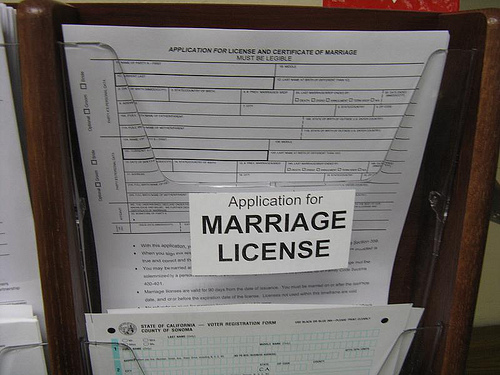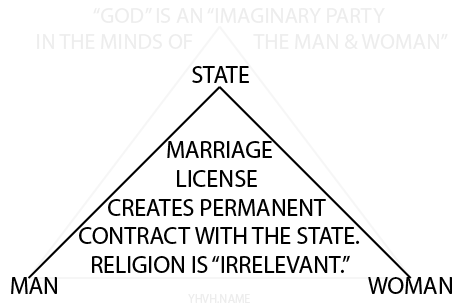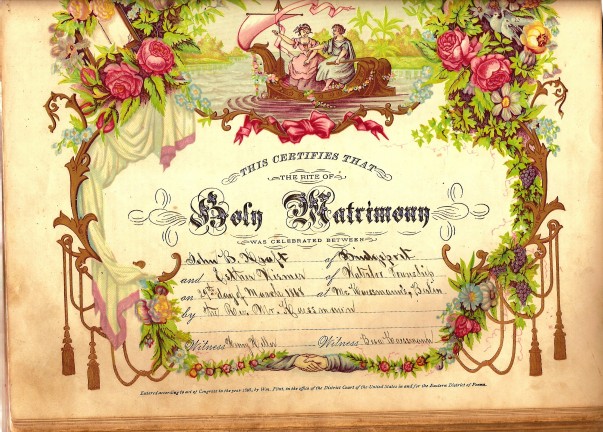Holy Matrimony
In addressing the profound distinction between Holy Matrimony and marriage, it is essential to delve into the spiritual and theological underpinnings that differentiate these two concepts. Holy Matrimony, as we discern from the scripture readings during its sacramental celebration, is an institution where God's sovereignty is paramount. It is not merely a union of two individuals but a sacred covenant in which God is an active participant. This divine involvement bestows upon the couple a unique status akin to a “domestic church,” where their union is built upon a foundation of godly love and commitment, transcending the mere legalities of a civil contract. The State's role in this sacred union is limited to that of a registrar, acknowledging the union without imparting any spiritual authority over it.
As we will hear throughout the scripture readings during the Sacrament of Holy Matrimony God is always in control, in one, but not necessarily in the other.
Holy Matrimony confers on each couple a status like that of a “domestic church” built on a foundation of love over which the State has no authority beyond that of merely a registrar.
In contrast, when we consider marriage in its civil context, as highlighted in the March 1873 issue of The Atlantic, it is primarily viewed as a civic arrangement.
Concerning marriage we read the following in the march 1873 issue of the Atlantic;
Marriage, in its obvious import, is a civic tie, enforced by the magistrate in the interest of public order. I, for example, A B, am a married man, entitled therefore to certain civic rights, such as the right to found a family, or call my children my own; and exposed, on the other hand, to certain civic pains, in case of my conjugal unworthiness, such as the breaking up of my family, or the separation of my wife and children from my care and authority, followed by the alienation of a portion of my worldly goods to their exclusive benefit.
This perspective of marriage emphasizes its societal and legal dimensions. It is described as a civic tie, enforced by the magistrate to maintain public order. Here, the individual, identified in the example as A B, is seen as a married person with certain civic rights and responsibilities. These include the right to establish a family and claim parental rights over children, balanced by the potential civic repercussions in cases of conjugal failure, such as family dissolution or separation from spouse and children, accompanied by financial consequences.
This civil view of marriage focuses on the legalistic aspects, treating it as a contract governed by civic laws and devoid of any inherent establishment of moral and spiritual values. It lacks the deeper, spiritual dimension that Holy Matrimony embodies, where the union is not only a matter of earthly legalities but a sacred covenant under God's guidance and blessing. In Holy Matrimony, the couple embarks on a journey not just of mutual companionship but of spiritual growth and fulfillment, guided by divine principles and enriched by a commitment that transcends earthly laws. This sacred union is a testament to the belief that marriage, in its highest form, is a divine institution, blessed and overseen by God, where love, faith, and commitment are nurtured in accordance with His will and purpose.
The following text is an abstract from an external source;
Virgil Cooper's story reveals a lot of the legalistics of the marriage license.
While in a discussion with a county clerk it was stated that for instance in the state of Arizona.
The marriage licensing is pretty much the same in the other states -- but there are differences.
One significant difference he mentioned was that Arizona is one of eight western states that are Community Property states.
The other states are Common Law states, including Utah, with the exception of Lousiana which is a Napoleonic Code state.
He then explained some of the technicalities of the marriage license.
 He said, first of all, the marriage license is Secular Contract between 3 parties: the State, the husband, and the wife.
He said, first of all, the marriage license is Secular Contract between 3 parties: the State, the husband, and the wife.
The State is the principal party in that Secular Contract.
The husband and wife are secondary or inferior parties.
The Secular Contract is a three-way contract between the State, as Principal, and the husband and wife as the other two legs of the Contract.
The Clerk said, in the "traditional" sense a marriage is a covenant between the husband and wife and God.
But in the Secular Contract with the state, the reference to God is not officially considered included in the Secular Contract at all.
The Clerk said, if the husband and wife wish to include God as a party in their marriage, that is a "dotted line" the spouses will have to add in their own minds.
The state's marriage license is "strictly secular," the Clerk said.
The Clerk said further, that what he meant by the relationship to God being a "dotted line" meant that the State regards any mention of God as irrelevant, even meaningless.
In the clerk's description of the marriage license contract, he related one other "dotted line."
He said in the traditional religious context, marriage was a covenant between the husband and wife and God with husband and wife joined as One.
This is not the case in the secular realm of the state's marriage license contract.
The State is the Principal or dominant party.
The husband and wife are merely contractually "joined" as business partners, not in any religious union.
The spouses are, the Clerk said, connected to each other by another "dotted line."
The picture the Clerk was trying to paint was that of a triangle with the State at the top and a solid line extending from the apex, the State, down the left side to the husband, and a separate solid line extending down the right side to the wife.
The dotted line between the husband and wife merely showing that they consider themselves to have entered into a religious union of some sort that is irrelevant to the State.
The Clerk further mentioned that this religious overtone is recognized by the State by requiring that the marriage must be solemnized either by a state official or by a minister of religion who has been deputized by the State to perform the marriage ceremony and make a return of the signed and executed marriage license to the State.
The clerk emphasized that this contractual consideration by the bride and groom places them in a definite and defined-by-law position inferior and subject to the State.
The Clerk commented that very few people realize this.
The clerk also said that it is very important to understand that children born to the marriage are considered by law as "the contract bearing fruit" -- meaning the children primarily belong to the State, even though the law never comes out and says so in so many words, the judges and social workers act on the assumption that the state controls the children.
Abstract from www.yhvh.name
Christ's life is the epitome of sacrificial love, a love that goes beyond mere feelings or emotions. It is a love that serves, sacrifices, and sanctifies. This is the kind of love that should be the cornerstone of every Christian marriage. It is a love that reflects Christ's love for the Church—a love that is selfless, unconditional, and redemptive.
In the context of marriage, when we speak of consuming each other's love, we are referring to more than just a physical union. It is a profound spiritual and emotional connection that, in God's eyes, constitutes marriage. This consummation is not merely a physical act; it is the culmination of a covenant, a sacred agreement between partners, made in the presence of God. It signifies the two becoming one flesh, as stated in Genesis 2:24, "Therefore a man shall leave his father and his mother and hold fast to his wife, and they shall become one flesh."
Genesis 2:22-25 (ESV)
“And the rib that the Lord God had taken from the man he made into a woman and brought her to the man. 23 Then the man said, “This at last is bone of my bones and flesh of my flesh; she shall be called Woman, because she was taken out of Man.” 24 Therefore a man shall leave his father and his mother and hold fast to his wife, and they shall become one flesh.  25 And the man and his wife were both naked and were not ashamed.”
25 And the man and his wife were both naked and were not ashamed.”
This biblical principle of a man leaving his parents and cleaving to his wife underscores the depth and permanence of the marital bond. It is a transition from one primary human relationship to another, signifying the establishment of a new family unit under God's ordinance. In this union, the husband and wife are called to support, respect, and cherish each other, reflecting the unity and love that is found in Christ.
In reflecting upon the biblical narrative of Adam and Eve, we gain insight into the original design and intent of marriage as ordained by God. Indeed, in the Garden of Eden, there were no human institutions, such as the church or state, to officiate or validate the union between Adam and Eve. Their union was inherently recognized and blessed by God, establishing the foundational principle of marriage as a divine institution.
This understanding brings us to a crucial point: the act of sexual union, within the Christian worldview, is not merely a physical act but a spiritual and covenantal one. It is the consummation and sealing of a sacred bond—Holy Matrimony—as instituted by God. In this context, the sexual union between a man and a woman is seen as the physical manifestation of their commitment and covenant before God, effectively solidifying their marital bond.
Therefore a man shall leave his father and his mother and hold fast to his wife, and they shall become one flesh.
When a couple enters into marriage, they are indeed entering into a contract with each other, but also with the state. The marriage license, issued by governmental authorities, is a legal document that formally recognizes the union. This legal recognition carries with it certain rights, responsibilities, and benefits that are conferred upon the married couple by the state. These may include, but are not limited to, tax benefits, inheritance rights, and decision-making privileges in healthcare and financial matters.
In Holy Matrimony, the couple dedicates their lives to each other, but importantly, they also dedicate their united life to God. This dedication is a recognition that their union is not merely for their mutual comfort and happiness but is also intended to serve a higher, divine purpose. It is an acknowledgment that their marriage is a reflection of God's love and is to be guided by His principles and teachings.
The role of the church and the pastor in the celebration of Holy Matrimony is significant. When a couple chooses to marry in the church, they are seeking God's blessing and acknowledging His sovereignty over their union. The pastor, representing the church, performs the rite of Holy Matrimony, not just as a ceremonial leader but as a witness to the covenant being made before God. In this sacred setting, the marriage is declared to be of God, with the pastor affirming the couple's commitment to a Christ-centered relationship.
The imagery of the three-stranded cord, with Christ at the center, is a powerful metaphor drawn from Ecclesiastes 4:12: "Though one may be overpowered, two can defend themselves. A cord of three strands is not quickly broken." This verse beautifully symbolizes the strength and resilience of a marriage that includes Christ as its core. In such a union, the couple is not only bound to each other but is also intertwined with Christ, creating a relationship that is fortified and enriched by His presence and guidance.
Ecclesiastes 4:9-12 (CEB)
“Two are better than one because they have a good return for their hard work. 10 If either should fall, one can pick up the other. But how miserable are those who fall and don’t have a companion to help them up! 11 Also, if two lie down together, they can stay warm. But how can anyone stay warm alone? 12 Also, one can be overpowered, but two together can put up resistance. A three-ply cord doesn’t easily snap.”

It is very important to note that this is not a relationship that can be entered if not both husband and wife are confessing to be Christians because 2 Corinthians 6:14 says that believers should not marry unbelievers:
"Be ye not unequally yoked together with unbelievers: for what fellowship hath righteousness with unrighteousness? and what communion hath light with darkness?"
Likewise, unless at least one of the parties are Christians, the marriage is according to the Psalms doomed to failure:
Psalm 127:1, (NKJV)
"Unless the Lord builds the house [or the family], they labor in vain who build it [with the state or a marriage license]."
A Christ-based Holy Matrimony has always been a joyous occasion. In Cana of Galilee, it was gladdened by the presence and blessing of the Lord Jesus Christ Himself.
Because God intended marriage to bring joy and blessings to your lives.
Ephesians 5:21-28 (KJV)
“Submit to one another out of reverence for Christ. 22 Wives, submit to your husbands as to the Lord.
23 For the husband is the head of the wife as Christ is the head of the church, his body, of which he is the Savior. 24 Now as the church submits to Christ, so also wives should submit to their husbands in everything.
25 Husbands, love your wives, just as Christ loved the church and gave himself up for her 26 to make her holy, cleansing her by the washing with water through the word, 27 and to present her to himself as a radiant church, without stain or wrinkle or any other blemish, but holy and blameless.
28 In this same way, husbands ought to love their wives as their own bodies. He who loves his wife loves himself.”
Holy Matrimony is;
Where we love, as Christ loves the Church.
Where we protect, as Christ protects His Church.
Where we care, as Christ cares for His Church.
Where we serve, as Christ has served for His Church.
Where we obey, because we know that Christ loves His bride.
Where we individually might be weak, but through Christ we can do All Things.

In Ephesians 5:25-27, Paul writes,
“Husbands, love your wives, just as Christ loved the church and gave himself up for her to make her holy, cleansing her by the washing with water through the word, and to present her to himself as a radiant church, without stain or wrinkle or any other blemish, but holy and blameless.”
This passage vividly illustrates the depth of Christ's love for the Church and sets a profound example of the love and commitment expected in a Christian marriage.
In the context of Holy Matrimony, the vows made by the groom and the bride are indeed reflective of this divine love and commitment. The groom is called to love and comfort his bride, to honor and keep her in all circumstances, and to preserve the sanctity of their bond, which is holy and unbroken. This commitment mirrors Christ's unwavering love and sacrifice for the Church. Similarly, the bride is asked to love and comfort her groom, to honor and keep him, and to maintain the sacredness of their union through all of life's joys and sorrows. These vows are not mere words; they are solemn promises that echo the covenantal relationship between Christ and the Church.
The mutual respect and love pledged in these vows are foundational to a Christian marriage. They are committed to journeying together in faith, supporting and uplifting each other, and growing together in spiritual unity. The bond of marriage, thus, is not only a personal and emotional connection but also a spiritual covenant that is nurtured and strengthened by the couple's shared faith in Christ.
In which a Christian groom is able to his bride to love her with all his heart's affection and to endow her with all his earthly possessions, giving her all the honor of his name and to share with her the grace of the Lord God Almighty upon his life.
The bride would be able to make this wonderful promise from the book of Ruth
Ruth 1:16b (CEB)
“Wherever you go, I will go; and wherever you stay, I will stay. Your people will be my people, and your God will be my God.”
Proverbs 31 describes a woman of noble character, (Proverbs 31 Woman) who is industrious, compassionate, wise, and deeply committed to the well-being of her household and community. She is a symbol of strength, dignity, and fearlessness in the face of the future, grounded in her faith and trust in God. Similarly, a godly man in the context of marriage is one who leads with love, integrity, and wisdom, reflecting Christ's love and sacrifice for the Church.
In such a union, where both partners are committed to living out these biblical principles, the relationship becomes a fertile ground for spiritual growth and blessings. This is not to suggest a life devoid of challenges, but rather a life where challenges are met with faith, resilience, and a deep-seated assurance in God's providence and guidance.
The phrase "Blessings from the Lord WILL rain down on this" captures the essence of the promise found in Scripture for those who live according to God's will and design. It is a recognition that when a marriage is rooted in and revolves around God's principles, it aligns with His purposes and is positioned to receive His blessings. These blessings may manifest in various forms – spiritual growth, deeper love and understanding, resilience in trials, and a profound sense of joy and peace that transcends circumstances.
This understanding of marriage as a covenant with God at its center is not just a contractual obligation; it is a journey of faith, love, and mutual edification. It is about building a life together that honors God, serves others, and reflects the beauty and depth of God's design for marriage. In this sacred partnership, both the godly man and the Proverbs 31 woman are not only able to grow individually in their walk with God but also collectively as they build a legacy that glorifies God and bears witness to His grace and love in their lives.







